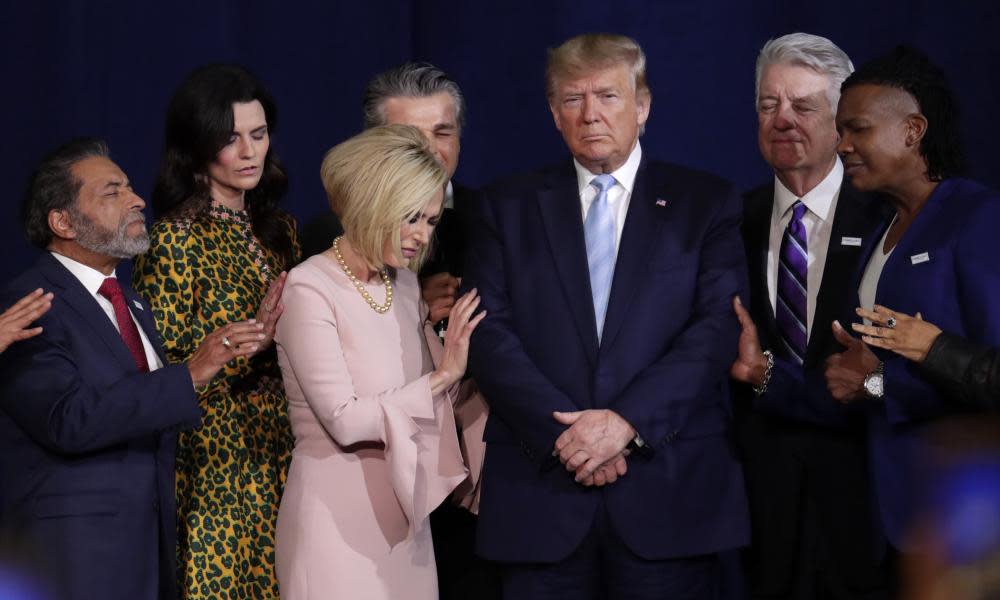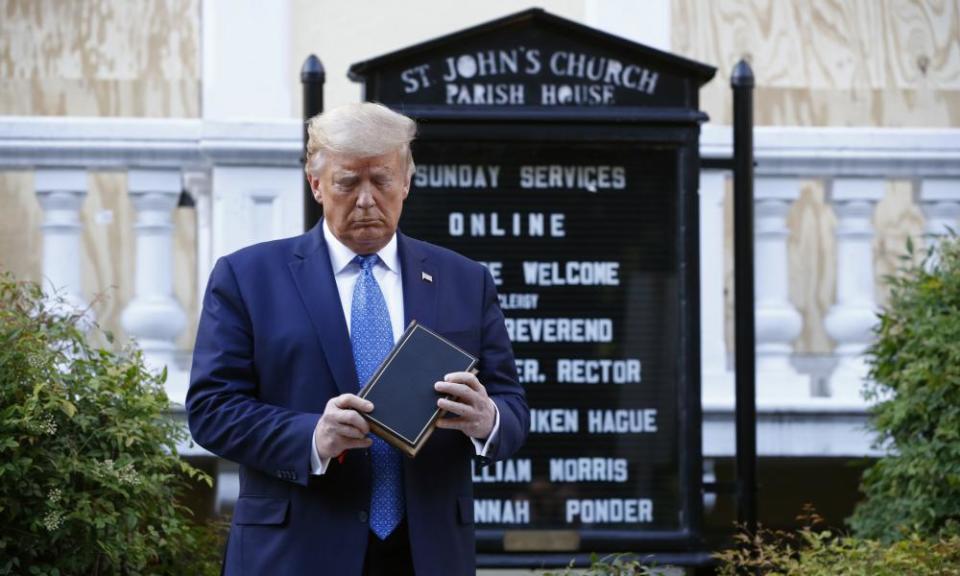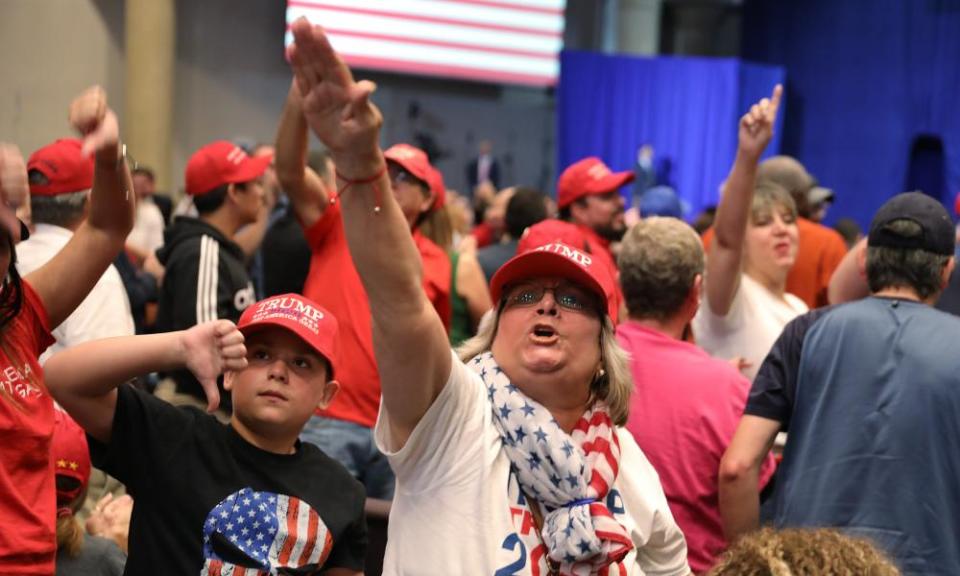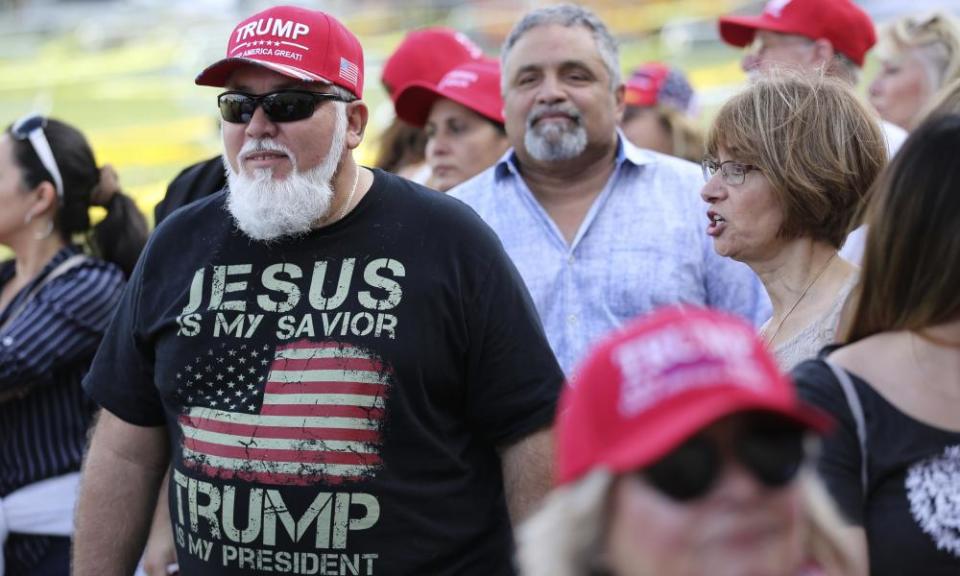Will Trump indictment make white evangelicals ditch ‘imperfect vessel’?

- Oops!Something went wrong.Please try again later.
- Oops!Something went wrong.Please try again later.
As Donald Trump blustered his way through his one-term presidency, dogged by accusations of sexual assault, tainted by a fascination with authoritarian leaders, and widely reviled for his apparent fondness for racists, America’s white evangelical Christians largely stood firmly by his side.
Evangelical leaders justified their support for Trump by comparing him to King Cyrus, who in the biblical telling liberated the Jews from Babylonian captivity, despite himself being a Persian ruler who did not believe in the god of Israel.
Related: Evangelical Christians flock to Republicans over support for Israel
Trump, like Cyrus, was seen as an “imperfect vessel”, according to evangelicals. That meant God was using him for the greater good – in this case to hand political and cultural power back to white conservative Christians, who had watched in horror as the United States became more diverse and less religious.
But King Cyrus had never been formally indicted in relation to hush money payments to an adult film star. As of Thursday, Trump has, becoming the first former US president to be criminally indicted.
With Trump, who was also the first president to be impeached twice, now expected to be formally charged in the sordid saga, will these white evangelicals finally turn away from their man?
No, said Robert Jones, the president and founder of Public Religion Research Institute and author of White Too Long: The Legacy of White Supremacy in American Christianity.
“The evidence from the public opinion data suggests that it will not make much difference,” Jones said.
“When we look back at his favorability over time over time, you know, I think there have been any number of these bright lines, where people thought: ‘Oh, this will be the thing that causes white evangelicals to abandon this candidate.’ But we just don’t see that much movement.”
Trump’s favorability with white evangelicals has hovered at around 70% since 2016, according to PRRI polling, even as an Access Hollywood tape emerged showing Trump bragging about sexually assaulting women, even as he failed to denounce white supremacists who had rallied in Charlottesville, and even when the story of hush money payments to Stormy Daniels first broke, in 2018.

None of it made any difference. In the 2020 presidential election, 75% of white evangelicals voted for Trump – hardly a huge drop-off from the 81% who pledged for him in 2016.
A common interpretation of that support has been that evangelicals were making a calculated decision – they “held their nose” and voted for Trump, and in return got conservative supreme court justices who could, and did, overturn the Roe v Wade decision, removing women’s constitutional right to abortion in the US.
But that’s not right, Jones said.
“It was never really about abortion. I think that that line is, frankly, a propaganda line for evangelical leaders to try to justify their support for Trump,” he said. “It was a more palatable reason for them to support Trump than what the data indicate the reasons actually were.”
The data showed that, actually, evangelicals really liked “the whole world view” Trump brought, Jones said. The slogan “Make America Great Again”, found a particular appeal.
“The most powerful word in that mantra was the last one,” Jones said. “What it did is it evoked this powerful sense of nostalgia for an America that many white conservative Christians saw slipping away.”
Jones pointed out that in Trump’s 2016 election campaign, “he was railing against Muslims and immigrants much more than he was railing against abortion”.
“At every rally he was talking about ‘build the wall’ to keep Mexican immigrants out of the US. He was going to ban travel from Muslim-majority countries. I think it was those kinds of appeals that communicated this worldview that the country was rightfully owned by white Christians, and he was going to protect that view of the country.”
John Fea, author of Believe Me: The Evangelical Road to Donald Trump and a professor of American historian at Messiah College, said there was already evidence that Trump’s legal woes will have little impact on his popularity.
“You would think you know that paying hush money to a porn star might rile some white evangelicals,” Fea said. “I would say it will have little impact at all on white evangelicals. We’re already seeing that through their social media feeds and through their statements on Facebook,” Fea said.
“They clearly see this as a witch-hunt. They see this as a politically motivated prosecution. Almost to a man and a woman that’s how they’re interpreting this.”
For decades, white Christians made up a majority of Americans, enjoying the influence that majority allowed – politicians were nearly always white and Christian, as were most top business leaders.
But their numbers began to decline through the 1990s, and by 2017, when PRRI conducted a survey on “America’s changing religious identity”, only 43% of the population identified as non-Hispanic white and Christian, and only 30% as non-Hispanic white and Protestant.
That sense of decline and of waning control over the country, as white evangelicals watched a black man elected president and same-sex marriage be legalized, continues to contribute to Trump’s support among white evangelicals, Jones said.
“Make America Great Again, to white evangelicals means: ‘Make America Christian Again’. Up until this point the Christian right’s agenda has always been tied to a candidate that they see as a ‘candidate of character’,” Fea said.
“What happens with Trump is you’ve got a guy who’s going to deliver on all his promises, who’s going to fight for you, but he’s not a man of integrity. So do you side with integrity of character or do you side with the policies? And we learned in 2016 that the policies are much more important.”
There is some evidence that the abandonment of integrity has gone beyond just the choice of political candidate.
A 2021 survey by PRRI found that white evangelical Protestants were the religious group most likely to agree with the sentiment: “Because things have gotten so far off track, true American patriots may have to resort to violence in order to save our country.”

White evangelicals were also the only religious group to majority oppose undocumented immigrants becoming citizens, while a majority of white evangelicals also believed the 2020 election was stolen from Trump.
The apparently unbreakable bond between evangelicals and Trump is an affinity that has been brewing for a long time, said Kristin Kobes Du Mez, author of Jesus and John Wayne: How White Evangelicals Corrupted a Faith and Fractured a Nation, and a professor of history at Calvin University.
Conservative evangelicals gained power through the 1950s and in the early cold war era, when their views on “traditional” families and cultural behaviors was largely matched by the rest of the country.
But in the 1960s the civil rights movement, the feminist movement and the anti-war movement began to change how Americans thought about each other and about politics. Rather than change with their countrymen and women, evangelicals instead “doubled down” on their Christian conservatism, Du Mez said:
“In a way that is oppositional, against fellow Americans and feeling like they have this special duty, this obligation as a faithful remnant, to restore America, to restore American greatness and to restore kind of traditional morals. That resentment mobilizes evangelicalism for generations.”
The election of Obama, and the changes that happened under his watch, created a “perfect storm”, Du Mez said, and proved a real trigger, as white evangelicals felt they were under threat and in crisis.
“This is where they’ve really started talking about religious liberty, and how they are embattled and they need a champion.
“So it actually works in Trump’s favor that he is not the kind of Sunday school poster boy. He’s not a man who exemplifies traditional Christian moral values. The fact that he doesn’t: his ruthlessness, his crassness, the fact that he will ‘do what needs to be done’. That makes him perfect for the moment.”
The rank and file seem to be on board with Trump, then, but some high-profile evangelical leaders have so far been less enthusiastic about Trump than they were in 2016 and 2020.

Robert Jeffress, the pastor of a Dallas megachurch who campaigned with Trump in 2016 and 2020, has said he will “stay out” of the Republican primary. Bob Vander Plaats, president and CEO of the Family Leader, tweeted in November that it was “time to turn the page” on Trump. Everett Piper, a conservative commentator and the former dean of the Christian Oklahoma Wesleyan University, wrote “Trump has to go” in a 2022 column.
That has prompted anger from Trump, who in January said it was “a sign of disloyalty” that faith leaders had yet to publicly back his 2024 campaign, and claimed anti-abortion messaging was responsible for Republicans’ poor performance in the 2022 midterms.
But the support of evangelical bigwigs might not matter, Du Mez said. In 2015 and 2016 key Christian figures were originally horrified by Trump, before coming round when it became apparent he would win the Republican nomination.
“The leaders were supporting people like Rubio and Cruz. And it didn’t matter. Because Trump’s appeal is a populist appeal,” Du Mez said.
“If the leaders try to redirect that support, they are the ones who are going to be on the outs.”
As Trump prepares to appear in court in New York, and as his legal woes elsewhere grow, one thing can make him rest easy. Whatever he says, and apparently whatever he does, white evangelicals will always have his back.

